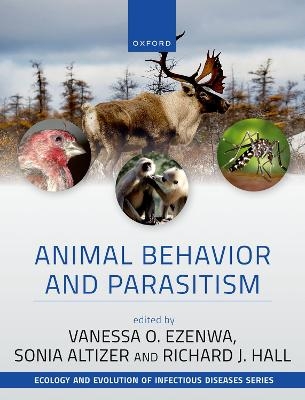
Animal Behavior and Parasitism
Oxford University Press (Verlag)
978-0-19-289556-1 (ISBN)
We live in a world teeming with parasites. Many animal behaviors, including social interactions, mating displays, and decisions about where to move, nest, and forage are shaped by interactions with parasites. The same is true for humans, where our attraction to mates, hygienic behaviors, food choices, and decisions about when and where to gather in groups often depend on current and perceived infection risk. In turn, behaviors like social distancing and self-medication can alter the trajectories of parasite transmission and evolution, as vividly illustrated by the ongoing COVID-19 pandemic. The myriad connections between animal behavior and parasitism have been the subject of growing research interest since the 1970s and 80s, when fundamental theories linking the two fields of study emerged. Since then, a combination of conceptual and technological advances, and increased integration of ideas across disciplines, have helped to uncover fascinating new connections between animal behavior and the ecology and evolution of infectious diseases. This accessible text surveys emerging research in this vibrant field. Chapters focus on fundamental topics at the interface of animal behavior and parasitism, and authors have been selected to provide a diverse and international perspective.
Animal Behavior and Parasitism is an upper-level text suitable for senior undergraduate and graduate level students as well as professional researchers in animal behavior/behavioral ecology, disease ecology, parasitology, and evolutionary biology.
Vanessa Ezenwa is a Professor in the Department of Ecology and Evolutionary Biology at Yale University. She studies interactions between hosts and their parasites from physiological, behavioral, ecological perspectives. She is a senior editor at Ecology letters and President-Elect of the Animal Behavior Society. Sonia Altizer is a Professor in the Odum School of Ecology at the University of Georgia. She studies infectious disease ecology and its interface with animal behavior, anthropogenic change, and evolution. Much of her empirical work focuses on monarch butterflies and a protozoan parasite to better understand the consequences of host movement for animal-pathogen interactions. Richard Hall is an Associate Professor at the Odum School of Ecology and Department of Infectious Diseases at the University of Georgia. He uses mathematical models to study host-parasite interactions and their response to global environmental change, with particular application to migratory animals and behavioral changes associated with urbanization and resource subsidy. He is also an avid birder and wildlife gardener.
| Erscheinungsdatum | 31.08.2022 |
|---|---|
| Reihe/Serie | Ecology and Evolution of Infectious Diseases |
| Zusatzinfo | 125 line drawings and halftones |
| Verlagsort | Oxford |
| Sprache | englisch |
| Maße | 192 x 253 mm |
| Gewicht | 968 g |
| Themenwelt | Naturwissenschaften ► Biologie ► Evolution |
| Naturwissenschaften ► Biologie ► Mikrobiologie / Immunologie | |
| Naturwissenschaften ► Biologie ► Zoologie | |
| ISBN-10 | 0-19-289556-7 / 0192895567 |
| ISBN-13 | 978-0-19-289556-1 / 9780192895561 |
| Zustand | Neuware |
| Informationen gemäß Produktsicherheitsverordnung (GPSR) | |
| Haben Sie eine Frage zum Produkt? |
aus dem Bereich


